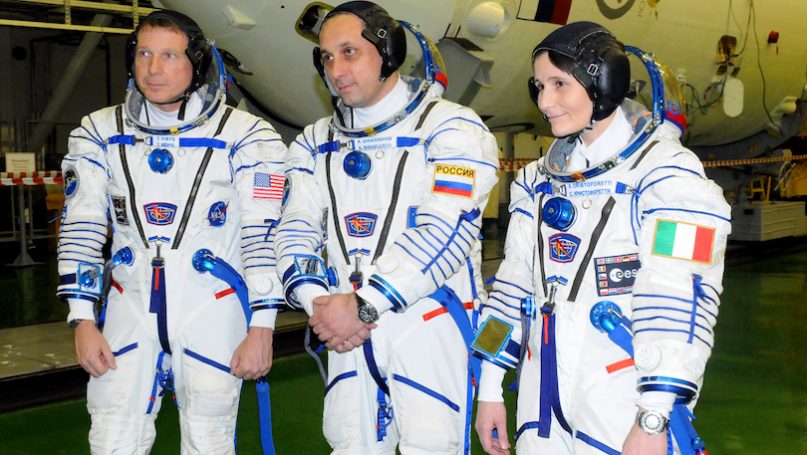
On a chilly evening in December 2019, top members of the United States Military gathered at Andrews Air Force Base for a special occasion. President Donald Trump was on hand to sign a defence authorisation bill into law, effectively creating a new arm of the military. The sixth branch of the armed forces of the United States. ‘This is a very big and important moment’ Trump told dignitaries and press officials present. He further said ‘American superiority in space is absolutely vital. We are leading, but we are not leading by enough. But very shortly, we’ll be leading by a lot’. The Space Force will rest under the auspices of the Air Force and their activities are geared towards potential threats from ‘anti-satellite weapons, space-based weapons and hypersonic attack vehicles’. This is not completely new. In 2015, the Russian Government established the Russian Aerospace Forces. However, the scale of this nascent U.S military arm is quite extensive.
The newly formed department is projected to have a workforce of around 15,000 military and civilian personnel. Despite this, its initial operative budget makes it one of the least significant dents on American military expenditure. Notwithstanding, it is indeed a seismic step forward by a sovereign state, and it is a decision that received broad bipartisan support on Capitol Hill. The Air Force Secretary Barbara Barrett noted at the event: ‘The launch of an independent U.S. Space Force propels us into a new era dedicated to protecting U.S. national interests and security in space’. The development brings forth existential questions that require vital answers on the nature of future human collaboration. One can argue it is inevitable that mankind will live comfortably on other celestial bodies within the next few generations, and humanity must prepare for that eventuality. This possibility will bring up serious avenues for competition, but also wonderful pathways for collaboration. According to Astronaut Scott Kelly, on the future of humankind in space: ‘it’s political science, not rocket science’.
Let us be frank, humankind is not exactly renowned for its willingness to collaborate, particularly when self-interest must be sacrificed. Though we have made enormous progress on the back of collaboration, the history of humankind is littered with stories of greed, corruption, and a constant willingness to stratify and dominate others. But as we step into the future, into the great beyond of space, that must remain buried in the sands of history. Humans must reject the identities that are protective shells for advancing personal interest and adopt a collective vision. One that allows for freedom and respect for sovereign thought processes, but also champions ethical and moral considerations. Most likely, this will occur at the level of the nation-state.
Thankfully, the body responsible for fostering major state collaboration already exists, albeit a very flawed body: The United Nations. And in October 1967, The Outer Space Treaty, formally called the Treaty on Principles Governing the Activities of States in the Exploration and Use of Outer Space, including the Moon and Other Celestial Bodies was promulgated precisely to deal with such concerns regarding the exploration of space. As of July 2020, only 110 countries have ratified the treaty, and it is replete with numerous shortcomings. For instance, the treaty does not prohibit military activities outside the earth, and its wordings on economic activities like asteroid mining lacks unequivocal resolution.
We are just 20 years into a volatile century, and if we do not have a united and ethical basis for exploring space, this could be our undoing as a species. Citizens across the world may be more willing to accept that heavily industrialised states are more welcome to maintain the pollution of the earth because they are creating a more conducive environment elsewhere, and this could lead to protracted conflicts on earth. Finally, the projected profits from mining asteroids and other celestial bodies range in the trillions, and this could lead to a corporate scramble like we have never seen before.
However, there is the possibility of a much brighter future than we could ever imagine. Advances into space would increase appreciation for human unity and lead to a more integrated international polity. All divisions amongst mankind such as religion, race and income could become less essential. Because as we discover more about space, we are going to discover more about ourselves. This will lead to an understanding that will shake the foundations of current human existence. Additionally, it could lead to the end of all forms of suffering created by economic disparities. Because revenues gained from extensive exploration could be equitably distributed for the benefit of all mankind. Hence, it is the duty of current leaders to address this, be transparent and foster a shared vision. This is not an issue for the next generation, but for all of us who exist today.
Further Reading on E-International Relations
- Military Honor in the Twenty-First Century: Some Contemporary Challenges
- Opinion – Getting Diversity ‘Right’ In Australia’s Nascent Space Industry Matters
- The Gaza Crisis: Restrictions and Challenges to the Humanitarian Space in Gaza
- Opinion – Virtual Diplomacy in India
- For All Humankind? The Continuation of Mid-Century US Space Goals
- Opinion – Thinking about Heroes and Humanity During COVID-19